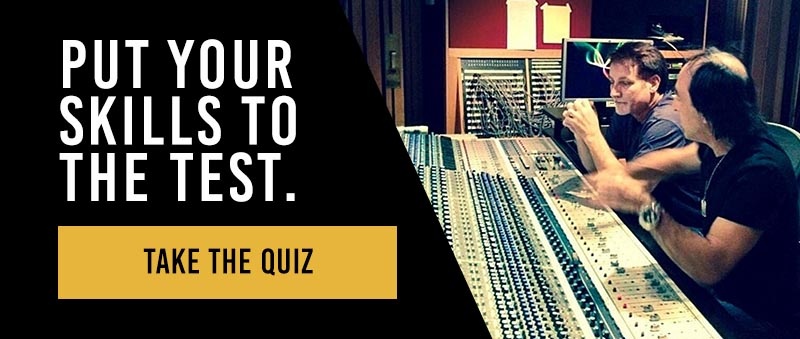Mark Rubel is the Director of Education, an instructor, and an integral component of the BBA team. Mark has recorded and produced extensively since 1980, both at his Pogo Studio in Champaign, Illinois and elsewhere. His list of clients includes Hum, Alison Krauss, Rascal Flatts, Fall Out Boy, Ludacris, Adrian Belew, Luther Allison, Jay Bennett, Melanie, Ian Hobson, Henry Butler, and many more. For the Ellnora: The Guitar Festival, he has recorded Los Lobos, Calexico, Ani DiFranco, The National, Junior Brown, Derek Trucks, Taj Mahal, and many others!

We sat down with Mark to hear where he got his start, listen to his audio advice for aspiring engineers, and get an inside look at his classroom experience. We hope you enjoy it!
How did you personally develop your audio skills?
I began playing bass at the age of twelve, and even before that was recording with whatever equipment was available- 4-tracks, 8-tracks, stone tablets. I grew up experimenting with sounds. A couple of friends and I helped out around the Experimental Music Studio at the University of Illinois starting in junior high school, so we got to be around the world of electronic music and tape composition from an early age. Upon graduation, a group of friends and I created a recording studio. Since 1980, the studio has been in constant development — reinvesting and getting more stuff – a.k.a. more instruments and more gear. We are in the same studio, so this is our 36th year! It started in a little ramshackle house in Urbana, Illinois, and then it moved into a warehouse building in downtown Champaign, IL, where it remained until 2013. At that time, I moved to Nashville to start The Blackbird Academy.
So it seems you got your start by literally opening a studio. How long did it take to monetize the business and actually see a positive result?
Well, we were pretty much up and running right away. It was a different world in 1980. Even though our opening rate was only $4.50 an hour, we moved up rather quickly.

What’s some practical audio advice for someone who is interested in getting into the audio engineering business?
-
-
- Become part of the audio community by consistently engaging. Join professional organizations such as the AES and NARAS, attend meetings, and get to know the people in your industry.
- Listen to a wide variety of music. Don’t stick to one genre. Listen to as many different things by as many different people as you can, and always listen critically.
- Record all the time. Anyone who has a computer or a phone has a recording device. It’s cheaper than ever and is like any other art — you get good at it by doing it. Try all the things you can think of, make mistakes, and don’t stick to the rules. What would happen if I put a mic here, or played the room or furniture as the instruments, etc. Stay creative. Stay open.
-
 <!– end HubSpot Call-to-Action Code —>
<!– end HubSpot Call-to-Action Code —>
How do you recommend analyzing and listening critically?
Learn to zoom your hearing in and out like a camera, from the overall impression to how loud a particular instrument is, down to a microscopic, granular level. What choices were made in crafting the recording? What sounds did they choose, and how would you go about re-creating them? Where did they place them in the stereo field? How are they stratified in the frequency spectrum? What did they leave out?
Do you have a favorite story from your career?
One time I was doing a live recording of a couple of blues guys from Chicago, a packed night in a good blues club. I was all set up, the console was ready, and the tape machine was good to go. Eventually, it became clear the bass player wasn’t going to show up, so I got up on the stage and played the gig. I ended up being the engineer, the producer, and the bassist for that record, so they had to credit me three separate times on the record. I think they spelled my name in three different ways, too.
That must have been terrifying!
It was, in a way, but it’s the blues. It’s pattern-based, and that sort of thing happens.

Favorite studio shortcuts or handy tricks?
- Try to use only a few mics, and move them around to find the right spot. It’s faster, easier, gives fewer phase problems, and usually sounds better.
- Commit to decisions such as recording with effects and choosing tones, and don’t put off making a decision. It’s OK to have a safety net or an extra microphone, but be bold.
- Get the sound at the source. Get it sounding the way you want it, and collect that sound properly in the first place. Too often, people capture mediocre sounds and attempt to rescue them later in post-production. Get it right in the beginning- that way you build the record as it’s going to be and base subsequent decisions on that solid ground. That way, you create strong statements rather than compromises.
- Mix fast. Second-guessing and overthinking are dangerous. Even if you are making a mix that takes hours or days to put together, in the end, make a 15-minute mix, and compare. Sometimes that mix will have the spark that you just can’t get by being too deliberate.
Also, when your ears glaze over, stop. Everybody has a different stamina level. It’s important not to monitor too loud. Many of my colleagues listen at ridiculous levels, which not only damages their hearing but exhausts their minds, making them unable to work as long.
Are there are typical studio problems you run into? If so, how does one prevent them?
- Things don’t work all the time — even at the highest level, so try to think in logical checklists:
First, try to isolate the problem — trace the signal from source to destination. For example, the issue could be: ‘I’m not hearing the snare drum.’
Question #1: Is there a snare drum?
Question #2: Is it being played?
Question #3: Is it the microphone?
Swap it with an SM57, a microphone that always works. If the problem goes away, it was the microphone. If not, then swap the cable. Keep working your way backward, and 80% of the time, you’ll go, “Oh, it’s me. This thing wasn’t turned on.”
2. Insufficient planning (or over-ambitious expectations)
Not allocating enough time to do what needs to be done is usually more of a client perception problem. You know, “Well, we’ve got ten songs, and it takes us an hour to play them, so we should be done with the record in 2 hours, right?” No. It just doesn’t work that way. Be realistic on the front end. You know it takes a while to get headphones going, and there is often some troubleshooting involved toward the beginning of the session. Playing time only ends up as a portion of the time it takes to record, and you should convey that to your client.
What did you wish more students knew coming into the program? What do you hear from employers?
Recording is a difficult industry. Only crazy people get into recording, as you can see. We don’t try to talk people into choosing this as a career. If you’re like us, then the career chooses you. You can’t help it, and you have to do it. If you’re that kind of person, then you would want to go to an excellent place – like Blackbird – where we are kindred spirits. If you’re all in, then you owe it to yourself to prepare as well as possible, and what better way than learning from people with decades of experience in recording studios who have made thousands of records? What I hear from employers is that they want people who are completely committed, smart, organized, disciplined, self-starting, and dedicated to the craft. Of course, they want them to have Pro Tools skills and all that, but they especially look for attitude and etiquette and an understanding of the social structure and working environment of a real recording studio.
What do you look for in TBA students?
What they know is less important than who they are. We’ve had many students come in who had to unlearn information or bad habits, and we have had great graduates who knew nothing when they came to the school. They are awesome people who thrive in an environment of unparalleled excellence. So what are we looking for? We are looking for a great attitude, curiosity, intelligence, eagerness, commitment, work ethic, the ability to get along with other human beings in a very smooth way, and a thirst for excellence.

What do you think is the best thing about Blackbird’s education?
It reflects the ethics of Blackbird. In my view, it’s the proper combination of theoretical information and application. My friend Tommy Wiggins says theory without application is useless, and application without theory is stupid. If we just walked into a studio and started doing things, it might seem like an interesting way to learn, but it would only apply to that studio, and you would never get the information behind what you are doing. As we teach theory, we always apply it because our classroom is a studio. It makes me happy that we have the right facilities, the right team, and the right community to create the most effective audio education there is.
What kind of classroom experience do you try to give your students?
I deliver a lot of information, but it’s done in a very anecdotal, story-telling way. I try to tie studio theory to practical examples and stories involving history, musical examples, important music-makers, etc.
The spirit in the classroom is very egalitarian. I don’t feel as though I am on a mountain top shouting down information that they all have to engrave somewhere. We create a community in our classroom, everybody learns from everybody else, and I have respect for everybody who comes in.
Also, we have many guests. During the course of the last class, we had more than 100 guest mentors. These guest mentors spend a few hours or a day with us, encapsulate what it has taken them decades to learn, and give it freely to the students. They do it because they believe in what we are doing. They believe in The Blackbird Academy, they believe in John McBride, they care about the business we are in, and they want it to be in the hands of committed people who know what they are doing. Many industry leaders are dismayed at some of the people they’ve seen entering the business under-prepared, inexperienced, and inadequately trained for the social aspects — how to function in the pressurized and highly complex world of recording. The guest mentors see themselves in our students, recognize that we are doing our utmost to give them a realistic educational experience, and choose to support that mission.
What are some of your favorite audio blogs/resources?
Pensado’s Place. They are all great, and it’s especially worth watching the people you’ve never heard of.
A friend named Lij Shaw runs Recording Rockstars, an excellent podcast.
Mix Magazine is a great and well-rounded resource featuring the excellent writing of my Co-Director Kevin Becka.
Tape Op Magazine is a great (and free) resource, oriented toward every level of recording, including talks with everyone from modern innovators to historic engineers, to equipment designers.
The blog and forum at Electrical Audio in Chicago, owned by Steve Albini, is fantastic and has a lot of great information: electricaudio.com.
